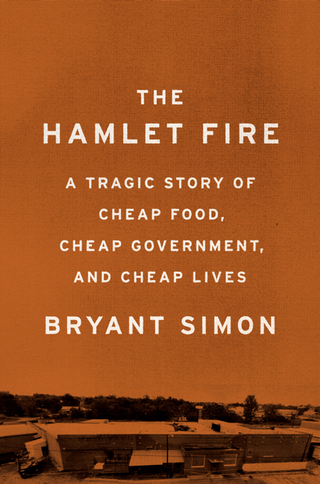
Podcast: Play in new window | Download (Duration: 23:25 — 19.1MB)
Subscribe: Google Podcasts | Spotify | Android | RSS | More
 Industrial accidents, tragic though they may be, can also lead to change. The fire at the Triangle Shirtwaist Factory in New York in 1911 is credited with changing a generation’s attitudes to worker safety, unions and regulation. Eighty years later, another industrial fire also killed workers because, like the Triangle fire, the doors were chained shut from the outside. That fire, at the Imperial Food Products plant in Hamlet, North Carolina, changed almost nothing.
Industrial accidents, tragic though they may be, can also lead to change. The fire at the Triangle Shirtwaist Factory in New York in 1911 is credited with changing a generation’s attitudes to worker safety, unions and regulation. Eighty years later, another industrial fire also killed workers because, like the Triangle fire, the doors were chained shut from the outside. That fire, at the Imperial Food Products plant in Hamlet, North Carolina, changed almost nothing.
In his new book The Hamlet Fire, historian Bryant Simon uses the fire to tell what he calls A Tragic Story of Cheap Food, Cheap Government and Cheap Lives. Simon’s thesis is essentially that the Hamlet fire wasn’t really an accident; circumstances conspired to make it likely, and if it hadn’t happened in Hamlet, it would have happened somewhere else. Among the points he makes: at the time of the fire North Carolina, a state that my imagination sees as resolutely rural, was the most industrialised of the United States. It had become so essentially by gutting control, regulation and inspection in order to attract jobs.
The USDA, responsible for the safety of the food people eat, agreed that a good way to keep out flies would be to lock the doors of the plant. But the North Carolina Occupational Safety and Health Administration had never once inspected the plant.
There’s a whole lot of Bryant Simon’s analysis that just wouldn’t fit comfortably in the episode. One nugget I really want to share here is a brief little scene from the first season of The Wire.
In a minute and a half, David Simon’s characters offer an object lesson in poultry economics, which Bryant Simon uses to explore the real history of the chicken nugget. And the dipping sauces are the key to overcoming chicken fatigue. Genius.
Notes
- Bryant Simon is a professor of history at Temple University in Philadelphia.
- His book The Hamlet Fire is available at Amazon and elsewhere.
- The music at the front is Hamlet Chicken Plant Disaster by Mojo Nixon and Jello Biafra, from their album Prairie Home Invasion.

Listened The Hamlet Fire What an industrial accident tells us about industrial food by Jeremy Cherfas from Eat This Podcast
We need some better regulations to prevent this type of race to the bottom… Companies that are found in violation of things like this should be forced to pay a multiple of the cost of having supported the potential regulations upfront in addition to major fines for the loss of life. Too many companies are free-riding on the fact that they’re not paying the cost for externalities which affect their workers, their environment, and their communities.
Syndicated copies to:
Author: Chris Aldrich
I’m a biomedical and electrical engineer with interests in information theory, complexity, evolution, genetics, signal processing, theoretical mathematics, and big history.
I’m also a talent manager-producer-publisher in the entertainment industry with expertise in representation, distribution, finance, production, content delivery, and new media.
View all posts by Chris Aldrich
Interesting!! I also like this podcast eatthispodcast.com/the-hamlet-fir… (and book) on the chicken economy.
Talking to @BryantSimon about “The Hamlet Fire: a tragic story of cheap food, cheap government and cheap lives”. What price now that bucket
Thanks so much to @EatPodcast for taking the time to talk to me about #thehamletfire eatthispodcast.com/the-hamlet-fir…